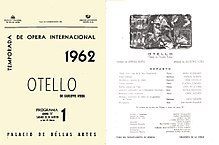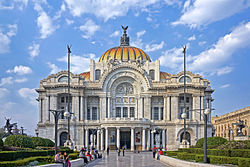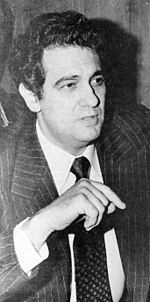José Plácido Domingo Embil [a] (born 21 January 1941)[1] is a Spanish opera singer, conductor, and arts administrator. He has recorded over a hundred complete operas and is well known for his versatility, regularly performing in Italian, French, German, Spanish, English and Russian in the most prestigious opera houses in the world. Although primarily a lirico-spinto tenor for most of his career, especially popular for his Cavaradossi, Hoffmann, Don José and Canio, he quickly moved into more dramatic roles, becoming the most acclaimed Otello of his generation.[2][3][4] In the early 2010s, he transitioned from the tenor repertory into exclusively baritone parts, most notably Simon Boccanegra. As of 2020, he has performed 151 different roles.[5][6]
Domingo has also achieved significant success as a crossover artist, especially in the genres of Latin and popular music. In addition to winning fourteen Grammy and Latin Grammy Awards, several of his records have gone silver, gold, platinum and multi-platinum. His first pop album, Perhaps Love (1981), spread his fame beyond the opera world. The title song, performed as a duet with country and folk singer John Denver, has sold almost four million copies[7] and helped lead to numerous television appearances for the tenor. He also starred in many cinematically released and televised opera movies, particularly under the direction of Franco Zeffirelli. In 1990, he began singing with fellow tenors Luciano Pavarotti and José Carreras as part of The Three Tenors. The first Three Tenors recording became the best-selling classical album of all time.[8][9]
Growing up working in his parents' zarzuela company in Mexico, Domingo has since regularly promoted this form of Spanish opera. He also increasingly conducts operas and concerts and was the general director of the Los Angeles Opera in California from 2017 to 2019.[10][11] He was initially the artistic director and later general director of the Washington National Opera from 1996 to 2011. He has been involved in numerous humanitarian works, as well as efforts to help young opera singers, including starting and running the international singing competition, Operalia. In the years 2019-2021 he has performed continuously on stages in Berlin, Budapest, Cologne, Graz, Madrid, Mérida, Milan, Monte Carlo, Moscow, Munich, Palermo, Rome, Salzburg, Sofia, Verona, Versailles, Vienna and Zurich.
Early life
Plácido Domingo was born on 21 January 1941 in the Retiro district of Madrid, Spain.[12] His mother recalled that she and her husband knew he would be a musician from the age of five, due to his ability to hum complex music from a zarzuela after seeing a performance of it.[13] In 1949, just days before his eighth birthday, he moved to Mexico with his family. His parents, both singers, had decided to start a zarzuela company there after a successful tour of Latin America. Soon after arriving in Mexico, Domingo won a singing contest for boys, and his parents occasionally recruited him and his sister for children's roles in their zarzuela productions.[14] Domingo studied piano from a young age, at first privately and later at the National Conservatory of Music in Mexico City, which he entered when he was fourteen. At the conservatory, he also attended conducting classes taught by Igor Markevitch and studied voice under Carlo Morelli, the brother of Renato Zanelli. The two brothers were famous practitioners of both baritone and tenor roles.[15] Domingo's conservatory classes constituted the entirety of his formal vocal instruction; he never studied privately with a singing teacher.[16]
In 1957, at age sixteen, Domingo made his first professional appearance, accompanying his mother on the piano at a concert at Mérida, Yucatán. The same year he made his major zarzuela debut in Manuel Fernández Caballero's Gigantes y cabezudos, singing a baritone role.[17] At that time, he was working with his parents' zarzuela company, eventually taking several baritone roles and acting as an accompanist for other singers.[18] The following year, the tenor in another company's touring production of Luisa Fernanda fell ill. In his first performance as a tenor, Domingo replaced the ailing singer, although he feared the part's tessitura was too high for him.[18] Later that same year, he sang the tenor role of Rafael in the Spanish opera El gato montés, illustrating his willingness to assay the tenor range, even as he still considered himself a baritone. On 12 May 1959 at the Teatro Degollado in Guadalajara, he appeared in the baritone role (sometimes sung by basses) of Pascual in Emilio Arrieta's Marina. Like El gato montés, Marina is an opera composed in the zarzuela musical style rather than a zarzuela proper, although both are usually performed by zarzuela companies. In addition to his work with zarzuelas, among his earliest performances was a minor role in the first Latin American production of the musical My Fair Lady, in which he was also the assistant conductor and assistant coach.[19] While he was a member, the company gave 185 performances of the musical in various cities in Mexico.
In 1959, Domingo auditioned for the Mexico National Opera at the Palacio de Béllas Artes as a baritone, but was then asked to sight-read the tenor aria "Amor ti vieta" from Fedora. He was accepted at the National Opera as a tenor comprimario and as a tutor for other singers.[20] In what he considered his operatic debut, Domingo sang the minor role of Borsa in Verdi's Rigoletto on September 23 at the Palacio de Bellas Artes in a production with veteran American baritone Cornell MacNeil and bass-baritone Norman Treigle. He later appeared as the Padre Confessor in Dialogues of the Carmelites, Altoum and Pang in Turandot, Normanno and Arturo in Lucia di Lammermoor among other small parts. While at the National Opera, he also appeared in a production of Lehár's operetta, The Merry Widow, in which he alternated as Camille and Danilo (both originally created as tenor roles, although the latter is often sung by baritones). Domingo made his debut in Verdi's Otello at Béllas Artes at age 21 in the summer of 1962 not in the title rôle for which he has now been internationally famous for decades as one of its greatest interpreters, but in the small comprimario part of Cassio.
To supplement his income, the young Domingo played the piano for a ballet company, as well as for a program on Mexico's newly founded cultural television station. The program consisted of excerpts from zarzuelas, operettas, operas, and musical comedies. He acted in a few small parts while at the theater in plays by Federico García Lorca, Luigi Pirandello, and Anton Chekhov.[21] He also provided song arrangements and backup vocals for Los Camisas Negras in the late 1950s, a rock-and-roll band led by César Costa.[22] In his autobiography, Domingo reflected on the benefits of his busy and varied career as a teenager: "Today, when people ask me how I manage to hold up under my extremely heavy work load, I answer that I became accustomed to intense activity very early in my life and that I love it now as I loved it then."[23]
Career
1960s–1980s
Establishing a career in opera
In 1961, Domingo made his operatic debut in a leading role as Alfredo in La traviata at the Teatro de la Ciudad in Monterrey.[24] Later the same year, he made his debut in the United States with the Dallas Civic Opera, where he sang the role of Arturo in Lucia di Lammermoor opposite Joan Sutherland in the title role and Ettore Bastianini as Enrico. In 1962, he returned to Texas to sing the role of Edgardo in the same opera with Lily Pons at the Fort Worth Opera.[25] It would be the soprano's final operatic performance. That November Domingo sang the second tenor role of Cassio to Mario del Monaco's celebrated Otello in Hartford, Connecticut. At the end of 1962, he signed a six-month contract with the Israel National Opera in Tel Aviv, but later extended the contract and stayed for two and a half years, singing 280 performances of 12 different roles.
In June 1965, after finishing his contract in Tel Aviv, Domingo auditioned at the New York City Opera. He was hired to make his New York debut as Don José in Bizet's Carmen with the company, but his debut came earlier than expected on 17 June 1965 when he filled in for an ailing tenor at the last minute in Puccini's Madama Butterfly. In February 1966, he sang the title role in the U.S. premiere of Ginastera's Don Rodrigo at the New York City Opera, to much acclaim.[26] The New York Times review noted: "Mr. Domingo was as impressive as ever—a big, burly, large-voiced singer who looks exactly as one would visualize a hero from Gothic Spain."[27] The performance also marked the opening of the City Opera's new home at Lincoln Center.[28]
His official debut at the Metropolitan Opera in New York occurred on 28 September 1968, when he substituted with little notice for Franco Corelli in Cilea's Adriana Lecouvreur with Renata Tebaldi. Two years before this Adriana Lecouvreur, he had already performed with the Metropolitan Opera at Lewisohn Stadium in Mascagni's Cavalleria rusticana and Leoncavallo's Pagliacci. Since then, he has opened the season at the Metropolitan Opera 21 times, more than any other singer, surpassing the previous record of Enrico Caruso by four.[29] He has appeared with the company every season since 1968–1969. He made his debut at the Vienna State Opera in 1967; at the Lyric Opera of Chicago in 1968; at both La Scala and San Francisco Opera in 1969; at Arena di Verona on July 16, 1969 as Calaf (his first) in Turandot with Birgit Nilsson; at the Philadelphia Lyric Opera Company in 1970; and at Covent Garden in 1971. In 1975, Domingo debuted at the prestigious Salzburg Festival, singing the title role in Don Carlo in an all-star cast with Nicolai Ghiaurov, Piero Cappuccilli, Mirella Freni and Christa Ludwig with Herbert von Karajan conducting. Thereafter Domingo frequently returned to Salzburg for a number of operas, as well as for several concert performances. He has now sung at practically every important opera house and festival worldwide.
Domingo first sang Mario Cavaradossi in Puccini's Tosca in a 1961 performance in Mexico City.[30] He sang Cavaradossi at the Met on February 15, 1969 with Nilsson (broadcast). 1971 he made his Covent Garden debut in the role. He continued to sing the part for many years, especially at the Met and in Vienna, eventually performing it more than any other of his roles.[31] In September 1975, Domingo debuted in the title role of Verdi's Otello at the Hamburg State Opera. It soon became his signature role and one of operas he performed most frequently (over 200 times).[32] He recorded the part three times in the studio and appeared in four officially released filmed versions of the opera. Oscar-winning Shakespearean actor, Laurence Olivier, declared after seeing the tenor in the role: "Domingo plays Othello as well as I do and he has that voice."[33]
Domingo has also conducted operas and occasionally symphony orchestras as well. On 7 October 1973 he conducted his first opera performance, La traviata starring Patricia Brooks at the New York City Opera. The same year he released his debut album as a conductor, Domingo Conducts Milnes/Milnes Conducts Domingo, with baritone Sherrill Milnes. Domingo increasingly began to appear as a conductor at major opera houses around the world. In late 1983, he led a performance of Johan Strauss's Die Fledermaus at Covent Garden, which was televised. Three years later, he made a studio recording of the operetta, in which he both conducted and sang the role of Alfred.



